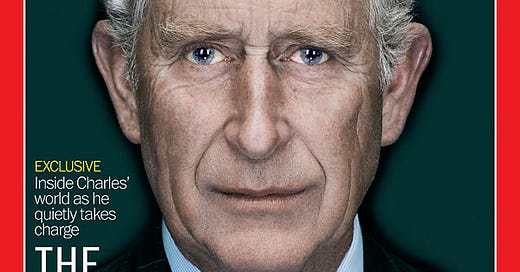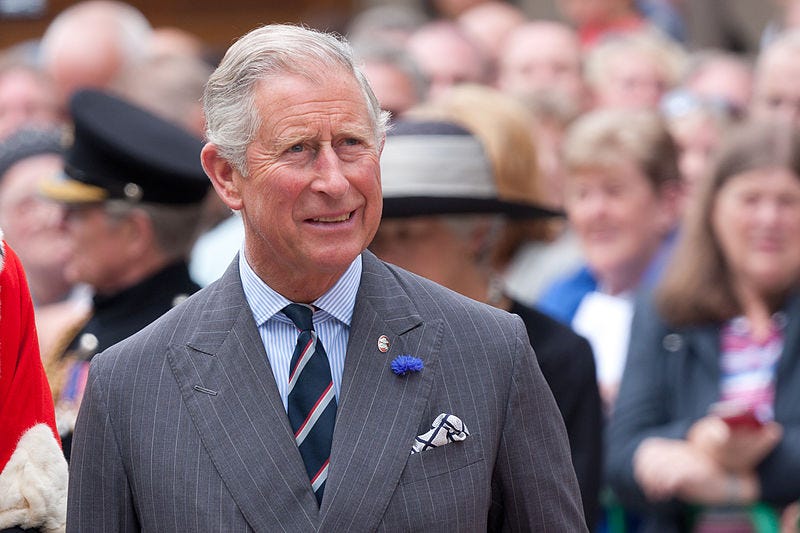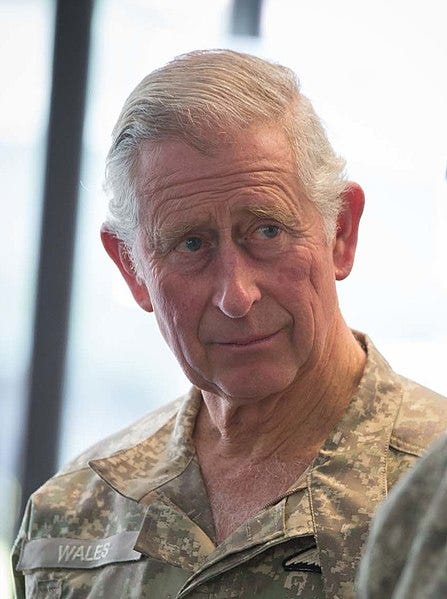Ten years ago, in 2013, TIME magazine ran an exclusive profile on then Prince Charles, with a cover story called “The Forgotten Prince” - a strange headline really, considering many in the press had never stopped talking about him.
Well, about one minor side of him, and a side, it turns out, they got almost entirely wrong…
A decade later, much has changed.
The Prince is now King Charles III, and for a man who has been part of the national fabric his entire life, it’s remarkable how many people are only truly seeing him now for the first time.
It’s hard to think of another figure whose public image has been so wide of the mark, spun around a few inaccurate anecdotes and the drama of a first marriage.
It’s hard to think of another instance where the public perception is so drastically different from the real person.
As Catherine Mayer wrote in 2013, “Much of what you think you know about the Prince is wrong. Much of what I thought I knew about the Prince was wrong.”
Ten years ago, Mayer discovered that the accepted public caricature was not the man. Far from being a petulant prince, he was a hardworking, dedicated philanthropist, adding, “little in the Prince’s world is quite what it might appear from the outside.”
In the months since he’s been King, the story of that real man seems to be breaking through. The transition to King Charles III was better than anyone could have hoped. From the immediate days after his accession to today, enthusiastic crowds have greeted him at every event. There’s been a definite shift in the press coverage. Royal and government aides who had worried about the country’s reaction for years, have no doubt breathed a massive sigh of relief.
But longtime supporters would probably say that Charles III is simply approaching his new role as he’s approached his entire life. Work hard, take charge, focus on improvements, and if something’s broken, come up with plans to fix it.
The only thing that’s changed, is that people are finally paying attention.
As King, he has been forthright and decisive, not hesitating to make decisions for the health and future of the monarchy, including a firm approach to dealing with his brother and son, Andrew and Harry.
The late Queen was known for a non-confrontational approach - her son seems to understand the boss has to be firm, not popular.
His actions have sent a clear message, Charles III is the captain now.
Not quite what the press of the past expected, when many said Charles was a little too “out there” to be monarch (talking to plants! promoting organic food!) meddling, spoilt, desperate to become King, and let’s not even start on the stories of a cold husband who neglected a goddess…
The fact that the same press also reported that he was regularly the hardest working member of the Royal Family, with the most public engagements, and most successful charities, did make you wonder how he managed all that scheming with his workload, but that particular contradiction was never addressed.
The soap opera stories were the ones that stuck.
In fact, the more ridiculous the story, the longer it would stick...
For instance, one story claimed that the Prince insisted on being served a row of boiled eggs every morning for breakfast, so he could choose the one with the perfect consistency.
Never mind that it wasn’t true, or that even as they reported it many also admitted, “it hadn’t been verified.”
Never mind that the Prince didn’t even eat eggs for breakfast. Julian Payne, his former communications secretary, said they never understood how that particular story exploded, "I never saw a single boiled egg at breakfast in all the years I worked there.” Instead, Payne said, The King begins his morning with the radio headlines (not the papers, more on that in a moment…) and “a breakfast of seasonal fruit salad and seeds with tea.”
How about the story that Charles travelled with his own personal loo seat? In reality it was a gag gift from his sister. Or that he was too lazy to squeeze his own toothpaste? (a story conveniently spread by his ex-wife’s staff…)
Did you know the truth in that case was far more serious? The King broke his arm in several places playing polo, needed hours of surgery and three nights in hospital. Then he “needed a second operation because one of the fractures he suffered failed to heal. Bone taken from his hip was packed around the break and a metal plate was secured with screws.” Ouch.
A sobering story about a serious injury, and a man who - temporarily - needed daily assistance with basic tasks. But it didn’t have the ring of, “Pampered Prince makes aide squeeze toothpaste!”
For some reason a younger King Charles couldn’t escape these stories. Exasperated friends and supporters, who knew the real man, shared his frustration, as he was reduced to a punchline. Yet when accurate stories were told about others, they barely got a mention. Angela Kelly, who served as Queen Elizabeth’s dresser, wrote in her book (with palace permission!) that the Queen requested a bath every morning filled with exactly seven inches of water, and that water had to be a certain temperature, confirmed with a specific wooden-cased thermometer.
A verified, slightly indulgent story barely made a ripple. Fictional nonsense about non-existent eggs? In every paper.
Charles had been typecast.
Combined with a marriage and divorce to the world’s most photographed woman, he never stood a chance.
The truth, as usual, is simple and much more ordinary.
A man who could have hunted, partied, and lived a high life, instead decided on something far more demanding and humbling - how to use his position to help others. Charles told Mayer, “I feel more than anything else it’s my duty to worry about everybody in this country, to try to find a way of improving things if I possibly can."
A young Prince Charles inherited the Duchy of Cornwall when he was only 3 years old and turned it into a thriving property portfolio, one that will continue to provide income and cover work expenses for every heir, and their family, into the foreseeable future.
He was created The Prince of Wales when he was only 9 years old, much younger than his mother when she became Queen, in fact, the same age as Prince George is now. (Does Prince William wonder in private what his father’s childhood was really like, when he looks at his son and considers the weight put on his father at the same age?)
With no job description or blueprint to follow, he decided for himself that his role should be to serve. Perhaps inspired by the centuries old motto of the Princes of Wales before him: Ich Dien (I serve). From that moment, he set about finding out what the most pressing needs of the day were, and how he could use his role to best address them.
Mayer remembered first seeing the Prince in 1985, when she was at the Economist. Prince Charles had requested a meeting with senior staff to “discuss how he might leverage his position to make the right sort of difference.”
It was something he had started working on a few years earlier. In 1976, Charles famously took his Navy severance pay, just a few thousand pounds, and founded The Prince’s Trust, a charity to help young people facing a time of high unemployment. It is now an international powerhouse (more on The Trust in another post!) and has helped everyone from Idris Elba to Jimmy Choo, to many young, British entrepreneurs.
It didn’t stop there - Charles III has founded more than 20 other charities, is patron of more than 400 others, and is said to have personally raised more money for charity than any other Briton in history.
The King advocated for organic food and spoke out about the dangers of pollution decades before it became mainstream. His first speech on the environment was in 1968, before anyone even coined the term “global warming”.
He convened a group of leaders for a meeting on the environment in 1991, a meeting that laid the groundwork for “the COPS” - The United Nations Climate Change Conference or Conference of the Parties - that continue to this day. As one insider said, “it’s hard to overstate the role he played.”
He promoted the importance of sustainability.
He worked for all Royal residences to be self-sustaining, reducing the strain on public money.
The speech he made about modern architecture, that exploded in the press for all the wrong reasons, had a different purpose that was barely reported. The Prince was urging architects to address fire regulations that made it impossible for disabled people to move through buildings. It’s standard today, back then he was one of the few advocating for change.
But you probably didn’t read about that…
As the Spectator wrote, “The Prince of Wales has repeatedly articulated truths in time for us to act on them. If he was an investor, his foresight would have made him a legend. As it is, he has asked for nothing back.”
What was it about Charles III that made him such a target, for so long? Britain's former chief rabbi Jonathan Sacks told TIME that he believed it was simply a case of Charles being: “bigger than the media can make space for."
James Sommerville, a former vice president at Coca-Cola, who owed his start to The Prince’s Trust, seemed to agree. Sommerville told Mayer, "If Prince Charles was in industry, he would be Richard Branson or Steve Jobs."
King Charles III reportedly has one simple rule to drown out the noise and focus on his work ~
He doesn’t read his own press ~ A decision made after the public turmoil of his first marriage.
A former British newspaper editor reportedly told Charles during the War of the Waleses, “It’s not that we’re against you, we’re just for her!” Diana was the Golden Goose, and the papers had no intention of letting go.
A hardworking prince, who genuinely wanted to use his position for good, was no match for a glamorous, jet setting ex-wife, especially one happy to keep the tabloids in the loop…
It was said that King Charles understood at that moment that trying to court the press was a losing proposition. It’s been reported that he immediately banned most newspapers from his home, turned off the television, and stuck mainly to the radio. (Remember those morning headlines Payne mentioned?)
His advisers even told Mayer that they "concluded years ago that there was little point in seeking to correct any but the most damaging calumnies."
The King and his team understood valid criticism, but they had to let go of refuting nonsense stories and tales of an old marriage.
When you look at the worst stories about Charles over the years, it’s amazing how it really boils down to a few anecdotes, that have been told so many times, they’ve taken on a life of their own.
No one was interested in “Prince Charles helped more people at a charity today” but one tale of a Prince losing his temper, was retold for decades. A few weeks of a broken arm became proof of a pampered prince.
And I can’t be the only one who shudders at the thought of the entirety of my life, being reduced to my worst relationship?
King Charles III will still face a fierce press, as evidenced in the last few days with the EU meeting and the decision to end Harry’s lease on Frogmore Cottage. The King and his team surely expect criticism and fair coverage, and no doubt understand the press have a job to do.
In her TIME magazine piece, Mayer said people who met Prince Charles back in the 1980’s were struck by his “earnestness” but didn’t think “he understood enough about the real world to be effective.”
She concluded at the time, that Charles would spend his life struggling to prove them wrong.
After years of being misunderstood, plagued by fictional stories and rumours that refused to die, is it possible King Charles III is finally being respected for the man he is, and always has been?
After losing more than his share of battles, has he finally won the war?









I have always admired the man… his efforts to help so many have made him an absolute icon of action. I followed with great interest the rehabilitation of Dumphries House and the many jobs he created, the incredible stories of grateful Prince’s Trust recipients, and don’t even get me started on his gardens. A truly wonderful King and a credit to his Nation.
Excellent article …. More should be reported about the success of the Prince’s Trust and the outstanding work that has helped so many less fortunate in the beginning become and contribute to the social fabric of the country